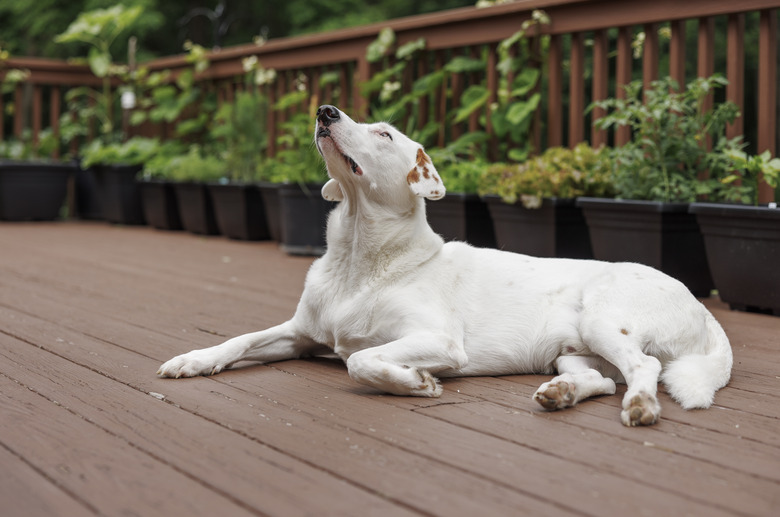Dog Diarrhea: Treatment And Causes
Dogs can get an upset digestive system just like the rest of us. There are many possible causes of dog diarrhea, ranging from a sudden change in food to intestinal parasites or something more serious, such as ingestion of a foreign object. If your dog develops diarrhea, treatment will depend on the cause. In mild cases where an adult dog is acting normally and still eating well, you can try a bland diet at home for a day or two. If you have an unvaccinated puppy with diarrhea, take them to your veterinarian right away because they are more likely to have something serious, like parvovirus.
What is dog diarrhea?
What is dog diarrhea?
Dog diarrhea is large amounts of loose, unformed stool occurring more often than normal. Diarrhea isn't an illness but a symptom that something isn't quite right. Usually, a dog's gastrointestinal tract is inflamed when they're suffering from diarrhea potentially caused by a bacterial or viral infection, parasites, or even a toxin. If they have a food intolerance to something in their diet, that may spur a bout of diarrhea too.
Diarrhea that originates in the small intestine will cause a dog to defecate at their normal frequency or slightly more frequently. Usually, the stool is watery. A dog whose diarrhea is a large intestine issue, such as colitis, will have very frequent but small bowel movements. These dogs may strain to poop (which might make it look like they have constipation even though they don't). They may also have blood and/or mucus in their stool.
What causes diarrhea in dogs?
What causes diarrhea in dogs?
There are many possible causes for diarrhea in dogs, ranging from a new food to something more serious, such as pancreatitis.
Causes include:
- Change in diet
- Dietary indiscretion, such as getting into the trash
- Stress, such as when boarding at a kennel
- Food allergies
- Intestinal parasites, such as Coccidia, Giardia, roundworms, hookworms, and whipworms
- Foreign objects in the gastrointestinal tract
- Viral infections, such as parvovirus or distemper
- Bacterial infection, such as Salmonella
- Pancreas issues, such as pancreatitis, or maldigestion conditions, like exocrine pancreatic insufficiency
- Inflammatory bowel disease
- Toxins
- Ulcers
- Tumors in the gastrointestinal tract
- A sensitive stomach, though this is due to an underlying cause, such as food intolerance
- Other health conditions, such as protein-losing enteropathy, which causes malabsorption
How serious is dog diarrhea?
How serious is dog diarrhea?
Whether or not a dog's diarrhea is serious depends on what's causing it, the dog's general health and age, and how mild or severe their symptoms are. Many cases of mild diarrhea can resolve on their own. If your dog is acting normal and eating and drinking as usual, you can try at-home management for up to 24 to 48 hours.
Things that indicate that your dog needs to be seen by a veterinarian instead of trying home remedies are:
- There's no improvement in the diarrhea within 24 to 48 hours
- Your dog is lethargic or acting sick
- Fever
- Signs of abdominal pain, such as a hunched posture
- Not eating or drinking
- Vomiting or retching
- The diarrhea is black and tarry in color
- Bloody diarrhea
- The dog is very young
- The dog is not fully vaccinated
- Elderly dogs
- The dog has underlying medical conditions
Dog diarrhea treatment at home
Dog diarrhea treatment at home
Changing your dog's diet to a simple, bland diet for a while may help with diarrhea. Instead of your dog's normal food, give them small, frequent servings of any of the following:
- Cooked white rice with skinless, boiled chicken breast
- Cooked white rice with skinless, boiled turkey breast
- Boiled egg
- Small amounts of boiled potato or baked potato (with no seasonings, oils, butter, or grease)
These foods should be offered four to five times a day. Increase the amounts of bland food a little at a time until your dog has a firm stool. Then, begin gradually mixing increasing amounts of regular dog food into their diet over the course of a week. Make sure your dog is drinking plenty of water as well.
Foods to avoid when your dog has diarrhea
Table scraps
If your dog has diarrhea, do not give them table food. Extras like these can cause additional intestinal irritation and should be avoided during this time. Fatty foods in particular will make your dog's diarrhea worse and can cause new symptoms, such as vomiting.
Snacks
Avoid dog snacks while your pet is having diarrhea. Some of these products can be rich in fat, dairy, or sugar, which can aggravate your dog's already-irritated digestive tract.
Human medications
Do not give your dog any human anti-diarrheal medications, such as Pepto-Bismol, Imodium, or Kaopectate. Depending on the cause of the diarrhea, these medications may not be the right choice and can worsen your dog's condition. Some of the ingredients in these products can also cause toxicity. Over-the-counter medications for humans should not be given to dogs unless you're instructed to do so by a veterinarian.
Dog diarrhea treatment
Dog diarrhea treatment
Treatment for your dog's diarrhea depends on the cause. If your dog is dehydrated, they will receive either subcutaneous fluids or intravenous (IV) fluids. Dogs who are seriously ill, such as a puppy with parvo, should ideally be hospitalized for medical treatment, which includes IV fluids, pain management, and antibiotics.
If your dog has an intestinal parasite, your veterinarian will dispense the appropriate deworming medication. Dogs with a bacterial infection that causes diarrhea may receive antibiotics. Dogs with diarrhea due to food allergies will be started on a hypoallergenic diet or a hydrolyzed diet.
In cases of chronic diarrhea, a pet may need prescription medication, probiotics, supplements, or a special diet. They may also need to have bloodwork, X-rays of the abdomen, and possibly an abdominal ultrasound. In some cases, intestinal biopsies and histopathology (looking at tissue under a microscope) may be needed to diagnose your dog's health issue.
While your dog has diarrhea, make sure they stay clean and dry. Promptly remove and clean any soiled bedding or blankets. Keep in mind that if your dog has diarrhea that is making them go more frequently, they will need to be taken outside more often to avoid any accidents in the house. Since they aren't able to control the diarrhea, never punish or yell at your dog for having diarrhea in the house.
The bottom line
The bottom line
Some common causes of diarrhea in dogs are changes in diet, intestinal parasites, and ingestion of a foreign body. If your dog's stool is bloody or tarry or if they are having very frequent bowel movements, are not feeling well, and are having a loss of appetite, take them to your DVM right away. For mild cases of diarrhea where your pet is still eating and acting normally, pet owners can try a bland diet for one or two days. But if your pet doesn't improve or if new symptoms develop, seek veterinary care right away.


